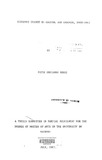| dc.description.abstract | This is a study of economic change of Kasipul
and Kabondo between 1800 and 1962. The study
employs the concepts of mode of production and
articulation as its theoretical framework. These
concepts have only recently become popular in social
studies in general, and historical analyses, in
particular. They are relevant to the understanding
of the dynamics of change because they help us
pose questions about the relationship between
the forces and relations of production, and about
the way the material base and the superstructure
interact. These are questions which are easily
ignored or overlooked by approaches that are based
on the theories of 'modernization and underdevelopment.
The use of mode of production and articulation
is based on the belief that history is a
dialectical process in which change is a culmination
of contradictions and internal tension within
any given situation.
In pre-colonial Kasipul and Kabondo contradictions
and tensions within the 'lineage mode of
production led to the segmentation of large lineages,
migrations and the setting up of new lineages.
Changes in the environment that were consequent upon
the settlement of new areas, also led to the development
of new technology and means of material
existence and changes in political organization.
These changes were exemplified by the transition
from a predominantly pastoral economy, to which the
people of Kasipul and Kabondo were accustomed In
the eighteenth century, to a mixed economy in which
crop cultivation was dominant, by the end of the
nineteenth century.
During the colonial period, the colonial
state played a major role in incorporating the
Kasipul and Kabondo economy into world cap it alism .
It did this through political conquest and the
establishment of a repressive administration. This
led to the loss of political independence by the
indigenous people. It also defined the political
parameters within which the colonial capitalist economy
was established and influenced the responses
of the local people.
The colonial state also established a system
of taxation which was aimed at the collection of
revenue for financing general administration and
also for drawing the local people into the capitalist
economy. Useful in the saciaIization of the
local people into the colonial world was Western
education, established mainly by the Christian missionaries. The new system of education emphasized
salvation from 'traditional' culture, obedience to
God and the colonial government, and work in the
colonial economy.
A more direct assault on the indigenous
economy by the colonial state was the introduction
and development of commodity production and wage
labour, and also, the extension of the market. To
achieve these and to serve the needs of capitalism
the colonial state partially dissolved and restructured
the indigenous economy.
The responses of the people of Kasipul and
Kabondo were also crucial in the development of the
colonial economy. In their responses the local
people considered the economic advantages of participating
in the colonial econorny . With in the Colonial economy they considered the advantages and
disadvantages of participating in alternative
economic activities: commodity production, wage
labour and trade. But all these considerations and
subsequent choices were ma dc within the context
of the colonial: situation. They in the end, determined
the extent of people's participation in, and
the development of, the colonial economy in the
area.
The establishment and development of the
colonial economy had a number of consequences in
Kasipul and Kabondo. For instance, it brought
about changes in forces of production as new crops,
tools and techniques of production were introduced.
It also led to changes in relations of production
as it created new needs among the people, and
established new relations of exploitation between
individuals and between individual families and
capital. Further) it resulted in a new process of
socio-economic differentiation | en |

